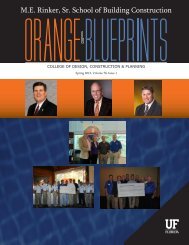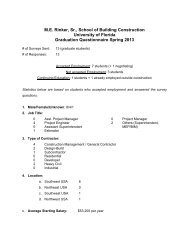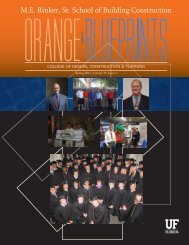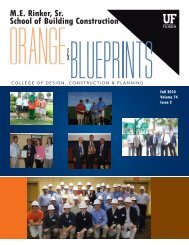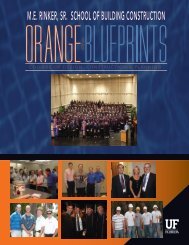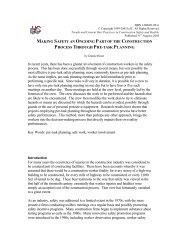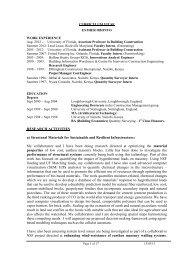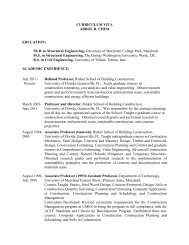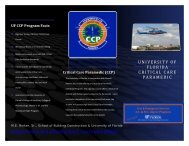Fall 2011 Newsletter - M.E. Rinker, Sr. School of Building ...
Fall 2011 Newsletter - M.E. Rinker, Sr. School of Building ...
Fall 2011 Newsletter - M.E. Rinker, Sr. School of Building ...
You also want an ePaper? Increase the reach of your titles
YUMPU automatically turns print PDFs into web optimized ePapers that Google loves.
Lessons Learned<br />
Written by Brandon T. Moore<br />
BSBC 2006, MSBC 2006, MBA 2010<br />
Senior Analyst, The Marnell Companies<br />
Adjunct Pr<strong>of</strong>essor, University <strong>of</strong> Nevada, Las Vegas<br />
Maximizing Construction Waste Recycling<br />
and/or Reuse<br />
For owners, contractors, sustainability consultants and other project<br />
stakeholders, construction waste management is an important,<br />
salient construction issue. To begin, construction & demolition<br />
(C&D) debris makes up a hefty segment <strong>of</strong> the overall waste stream.<br />
Further, high rates <strong>of</strong> recycling and/or reuse can help project teams<br />
achieve multiple points within the United States Green <strong>Building</strong><br />
Council’s (USGBC) Leadership in Energy & Environmental Design<br />
(LEED) rating system. Finally, and perhaps most importantly,<br />
a concerted waste effort can streamline site operations and reduce<br />
project costs.<br />
According to a 1998 Franklin & Associates’ report to the United<br />
States Environmental Protection Agency (EPA), Construction and<br />
Demolition (C&D) debris accounts for 35 to 45% <strong>of</strong> the overall<br />
waste stream. Further, Franklin & Associates estimate that only<br />
approximately 20 to 30% <strong>of</strong> this C&D debris is actually diverted,<br />
recycled or reused and kept out <strong>of</strong> Municipal Solid Waste (MSW)<br />
landfills or unpermitted landfills. These statistics alone are impetus<br />
enough for strategic construction waste management that limits additions<br />
to the waste stream, diverting potential resources elsewhere<br />
for use.<br />
The USGBC, with its LEED rating system, has recognized the sustainable<br />
impact that prudent construction waste management can<br />
have for a project and the surrounding community. As such, project<br />
teams may achieve up to three (3) points under Materials & Resources<br />
Credit No. 2 (New Construction 2009) for recycling efforts<br />
on a weight or volume basis. Points may also be achieved for reuse<br />
<strong>of</strong> materials that are salvaged and reinstalled onsite.<br />
In keeping with the triple bottom line benefits <strong>of</strong> sustainability and<br />
green building, effective construction waste management can cut<br />
project costs in addition to providing environmental and societal<br />
impacts. For example, demolition contractors may reduce or eliminate<br />
tipping fees and other waste disposal costs on a project due to<br />
the <strong>of</strong>fsetting financial benefit received from the recycling <strong>of</strong> valu-<br />
able materials, including steel, copper<br />
and concrete in particular. Likewise,<br />
construction waste haulers <strong>of</strong>ten discount<br />
their disposal fees for this same<br />
reason.<br />
However, waste during the construction<br />
process is <strong>of</strong>ten less valuable and<br />
less homogeneous than those items<br />
recycled and/or reused during demolition.<br />
Therefore, project teams,<br />
sustainability consultants and the contractor<br />
in particular must apply other strategies to achieve high recycling<br />
and reuse rates while limiting the overall volume <strong>of</strong> waste<br />
being generated throughout the construction phase.<br />
As a sustainable leader on several LEED projects and sustainability<br />
adjunct pr<strong>of</strong>essor, I’ve discovered the following strategies to reduce<br />
the waste burden on projects:<br />
-“Pack-in, Pack-out” policy for subcontractor deliveries or materials<br />
storage; subcontractors are more capable <strong>of</strong> reusing these items<br />
and diverting them from landfills;<br />
-Require subcontractors to return non-recyclable items back to<br />
their storage facility for salvaging/recycling via a trade-specific reuser/recycler/community<br />
materials exchange;<br />
-Prohibit the dumping <strong>of</strong> open liquid materials into disposal containers<br />
that may contaminate otherwise viable recyclables;<br />
-Seek additional vendors for specialized recyclables, don't limit<br />
yourself to one recycler (eg., gypsum, insulation). The right<br />
partner(s) make all the difference in waste management.<br />
Combined, these strategies will reduce hauling costs and volumes,<br />
achieve necessary LEED points, increase recycling and reuse rates<br />
onsite as well as in the community and maximize the impact <strong>of</strong><br />
your overall construction waste management plan in furtherance <strong>of</strong><br />
streamlined site operations and resource efficiency. When looking<br />
at waste, see an opportunity for the project rather than refuse.<br />
If you would like to submit an article for the “Lessons<br />
Learned” section <strong>of</strong> the newsletter, please contact Kim<br />
Stanley at kimms@ufl.edu.<br />
Charles Perry Construction, Inc. and PPI Construction Management, Inc. join forces as Charles Perry Partners,<br />
Inc. (CPPI)<br />
Longtime Gainesville-based contracting affiliates<br />
Charles Perry Construction, Inc. (CPC) and PPI<br />
Construction Management, Inc. have joined forces<br />
as Charles Perry Partners, Inc. (CPPI) to become<br />
the 4th largest Florida-based general contracting<br />
and construction management firm with revenues <strong>of</strong> $202 million.<br />
Founded by Charles R. “Chuck” Perry (BCN 1960) and operated<br />
separately since 1968 and 1993, respectively, under the ownership<br />
<strong>of</strong> Principals Breck A. Weingart (BCN 1980), John<br />
V. Carlson, Domenic E. Scorpio (BCN 1998), and<br />
Brian K. Leslie (BCN 1994), the award-winning<br />
companies have long shared estimating/cost management<br />
staff. CPPI specializes in commercial, educational,<br />
healthcare, governmental and institutional construction,<br />
and also operates Jacksonville, Orlando and Tampa <strong>of</strong>fices.<br />
9






